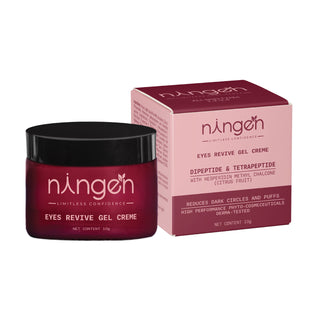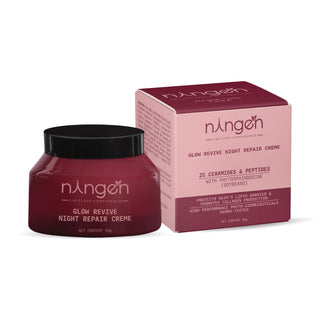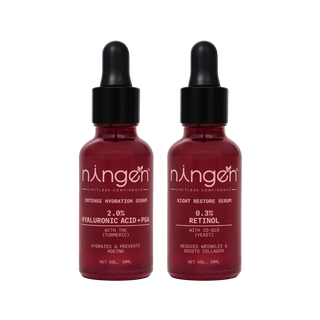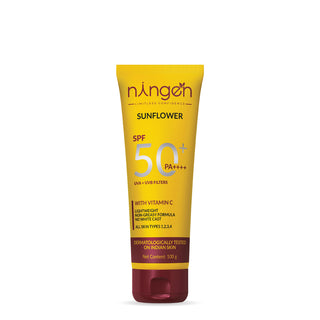"Phytosphingosine: The natural ingredient your skin will thank you for."
In the ever-evolving world of skincare, finding new and effective ingredients can feel like uncovering hidden treasures. One such gem gaining attention is phytosphingosine. But Is phytosphingosine good for your skin?
While it may not be as well-known as hyaluronic acid or retinol, phytosphingosine is a naturally occurring lipid that plays a pivotal role in maintaining healthy, radiant skin.
Join us on an exciting journey into the science behind phytosphingosine, exploring its incredible benefits and why it’s poised to become your new skincare superhero. Get ready to discover why this powerful ingredient deserves a spot in your skincare arsenal and how it can help you unlock your skin's full potential.
In This Article;
- What is Phytosphingosine?
- Sources of Phytosphingosine
- Benefits Of Phytosphingosine for The Skin
- Treatment of Acne and Blemishes
- Anti-aging Effects
- Why is Phytosphingosine Needed Externally?
- Incorporating Phytosphingosine Into Skincare Routines
- Phytosphingosine in Skincare
- Optimal Concentrations
- Ingredients Compatible With Phytosphingosine
- The Bottom Line
- TL;DR(Too Long Did'nt Read)
- Frequently Asked Questions
What is Phytosphingosine?
Phytosphingosine is a natural chemical found in the outer layer of your skin. It is a type of lipid and is known to be a constituent of ceramides. As a component of the skin's natural moisture barrier, it plays an integral role in maintaining the barrier function and overall skin health. This makes it a useful ingredient in skincare products to help with conditions like acne and to keep your skin looking clear and smooth.
Scientifically, Phytosphingosine is a phospholipid, a class of lipids that are key components of all cell membranes. In human skin, it is particularly important for its role as a building block of ceramides, which form a critical part of the stratum corneum, the outermost layer of the skin. Ceramides, including those containing phytosphingosine, are essential for a healthy skin barrier, protecting against moisture loss and defending against harmful external elements.
Naturally occurring in the upper layers of the skin, phytosphingosine can be found in both natural ceramides and synthetic ceramides used in skincare products. It is considered a key molecule in maintaining the natural moisturizing factor and the healthy structure of the skin barrier.
Sources of Phytosphingosine
Phytosphingosine is a naturally occurring lipid that can be derived from various sources. Here are some common sources:
Yeast: Yeast is one of the primary sources of phytosphingosine. It can be extracted through fermentation processes.
Plants: Certain plants, especially those rich in ceramides, can be sources of phytosphingosine. These include wheat germ, rice bran, and soybeans.
Soybeans: Soybeans are a notable source of phytosphingosine. They contain naturally occurring lipids that can be extracted and used in skincare products.
Animal Sources: Phytosphingosine can be extracted from the skin cells of animals, although plant and yeast sources are more commonly used in skincare formulations due to ethical and sustainability concerns.
Microorganisms: Some bacteria and fungi can produce phytosphingosine. Biotechnology methods can harness these microorganisms to produce phytosphingosine through fermentation.
Synthetic Production: Advances in biotechnology allow for the synthetic production of phytosphingosine in laboratories. This method ensures purity and consistency in the final product.
Benefits Of Phytosphingosine for The Skin
Anti-inflammatory properties
Phytosphingosine exhibits notable anti-inflammatory properties, which are thought to arise from its ability to modulate the immune response within skin cells. By mitigating the factors contributing to inflammation, this compound can help soothe irritated skin, making it particularly beneficial for those with reactive skin types. Its inclusion in skincare formulations can bolster the natural defenses against inflammation-driven skin issues.
Suppression of cutaneous inflammation
As an agent for suppressing cutaneous inflammation, phytosphingosine contributes to reducing the visible signs of inflammation, such as redness and swelling, on the skin's surface. It works within the skin’s layers to calm inflammatory reactions and is therefore incorporated into products aiming to alleviate inflamed skin, particularly for people battling chronic dry skin, eczema, or other inflammatory skin conditions.
Treatment of skin conditions like psoriasiform dermatitis
Given its role in inflammation suppression, phytosphingosine has potential in treating skin conditions like psoriasiform dermatitis—a condition with features similar to psoriasis, characterized by scaling and erythematous patches. Research indicates that phytosphingosine can help ease the symptoms of such skin disorders, supporting its therapeutic use alongside other treatments. However, professional medical advice should be sought for individuals with specific skin conditions before incorporating new products with active ingredients such as phytosphingosine into their skincare regimen.
Phosphingosine research table:
|
Property/Effect |
Description |
|
Anti-inflammatory |
Reduces immune response markers; soothes skin irritation. |
|
Signaling Pathway Modulation |
Inhibits pathways leading to cytokine production; decreasing inflammatory processes. |
|
Suppression of Inflammation |
Alleviates surface-level redness and swelling; benefits inflammatory skin conditions. |
|
Treatment of Skin Conditions |
Indicated for conditions like psoriasiform dermatitis; should be used with professional guidance. |
Treatment of Acne and Blemishes
Phytosphingosine is a type of lipid that occurs naturally in the skin as part of the ceramides that maintain the skin barrier function. It's widely recognized for its role in keeping the skin healthy by supporting the natural moisture barrier. This lipid is beneficial for various skin types, including sensitive and acne-prone skin.
One of the main benefits of phytosphingosine is its ability to calm inflamed skin, making it a desirable ingredient for treating skin conditions such as acne and blemishes. As an active ingredient in many skin care products, phytosphingosine can help to restore a healthy skin barrier, which is essential for skin that has been compromised or damaged.
|
Benefits for Acne and Blemishes |
|
Calms inflamed skin |
|
Helps maintain a healthy skin barrier |
|
Aids in reducing the appearance of blemishes |
In terms of barrier function, phytosphingosine helps fortify the outer layers of human skin against external stressors. It supports sensitive or dry skin, contributing to better overall skin health. Skincare products containing phytosphingosine should be thoroughly vetted—reviewing the ingredient list for additional components that are compatible with your skin’s needs is crucial for optimal results.
Anti-aging Effects
Phytosphingosine is known to play a role in maintaining a healthy skin barrier. It is a type of lipid that occurs naturally in the skin as a component of ceramides, which are essential for skin health. Its inclusion in skincare products is beneficial, especially for sensitive or inflamed skin. With its ability to support the skin's natural moisture barrier, it helps to protect the outer layers of the skin from environmental stressors. Regular application of products containing phytosphingosine can assist in nurturing the skin's natural defense system.
By bolstering the skin barrier function, phytosphingosine may indirectly contribute to anti-aging effects in the skin. A healthy skin barrier retains moisture more effectively, leading to less dry skin and potentially reducing the appearance of fine lines and wrinkles. Additionally, it can aid in calming irritated skin, which is crucial for a healthy and youthful complexion.
Phytosphingosine, alongside other active ingredients, can help in creating a balanced environment for skin cells to flourish. This balance is necessary for all skin types to maintain a rejuvenated and youthful look, thereby implicitly supporting the notion that phytosphingosine is good for your skin concerning anti-aging effects.
Why is Phytosphingosine Needed Externally?
Phytosphingosine is a vital lipid naturally present in the skin's outer layer, playing a crucial role in maintaining skin barrier function and hydration. However, due to factors like aging, environmental stressors, and harsh skincare products, the natural levels of phytosphingosine in the skin can diminish. This reduction weakens the skin's barrier, making it prone to dryness, irritation, and inflammation.
By applying phytosphingosine externally through skincare products, you can replenish its levels, helping to restore and strengthen the skin barrier. This, in turn, improves the skin's ability to retain moisture, reduces inflammation, and promotes a healthier, more resilient complexion. External application of phytosphingosine can enhance the skin's overall health and appearance, making it an essential ingredient in effective skincare formulations.
Incorporating Phytosphingosine Into Skincare Routines
Incorporating phytosphingosine into your skincare routine can be a strategic move for enhancing skin health. As this type of lipid is a natural constituent of healthy skin, topical application through skincare products can support those with compromised skin barrier function. Individuals with skin types ranging from dry to acne-prone may benefit from its soothing and restorative properties.
When adding products with phytosphingosine to a routine, it is advised to start with a gentle formula. Introduce the product gradually, particularly if you have a sensitive complexion, to allow the skin to acclimate. Used typically in serums, creams, or targeted treatments, it should be applied to clean skin, either once or twice daily, depending on the product instructions and skin response.
Phytosphingosine in Skincare
Phytosphingosine is a versatile ingredient that can be used in various skincare products due to its beneficial properties. Here are some types of skincare products where phytosphingosine is commonly used:
1. Moisturizers
Phytosphingosine helps to strengthen the skin barrier and retain moisture, making it a great addition to daily moisturizers for both the face and body.
2. Serums
In serums, phytosphingosine can provide targeted treatment for issues like acne, redness, and irritation, delivering high concentrations of the ingredient directly to the skin.
3. Cleansers
Including phytosphingosine in cleansers can help soothe and protect the skin while effectively removing impurities without stripping the skin’s natural oils.
4. Toners
Phytosphingosine-enriched toners can help to balance the skin’s pH and prepare it for subsequent skincare steps, while also providing anti-inflammatory benefits.
5. Face Masks
In face masks, phytosphingosine can provide a soothing and restorative treatment, helping to calm the skin and reduce inflammation.
6. Spot Treatments
Phytosphingosine is effective in spot treatments for acne due to its antibacterial and anti-inflammatory properties, helping to reduce breakouts and soothe affected areas.
7. Eye Creams
In eye creams, phytosphingosine can help reduce puffiness, redness, and irritation around the delicate eye area, promoting a more refreshed appearance.
8. Night Creams
In night creams, Phytosphingosine deeply hydrates and nourishes your skin overnight, enhancing skin barrier, reducing inflammation, and promoting a calm, radiant complexion.
9. Exfoliants
Phytosphingosine can be used in exfoliating products to help reduce irritation and inflammation that can sometimes be caused by exfoliation, ensuring a gentler experience.
10. Sunscreens
Including phytosphingosine in sunscreens can help to protect the skin from UV-induced damage and calm any inflammation caused by sun exposure.
11. After-Sun Care
Products designed to soothe and repair sun-exposed skin can benefit from the calming and restorative properties of phytosphingosine.
12. Anti-Aging Products
Phytosphingosine can be included in anti-aging creams and serums to help reduce the appearance of fine lines and wrinkles by supporting skin barrier function and hydration.
13. Lip Balms
In lip care products, phytosphingosine can help to soothe and protect the lips, keeping them hydrated and smooth.
Optimal Concentrations
The optimal concentration of phytosphingosine in skincare products can vary based on the formulation and intended use of the product. Research on the concentrations of this ingredient for effective results is still ongoing. However, a general guideline from available studies suggests a concentration range between 0.2% to 5%.
It is essential to follow the manufacturer's advice on usage, as some concentrations may be too potent for certain skin conditions or types. In skin care products, efficacy is not always directly proportional to the concentration of the active ingredient, as formulation compatibility and penetration into the upper layers of the human skin are pivotal for performance. Consulting a dermatologist can provide further guidance on appropriate concentration levels for individual skin care needs.
Ingredients Compatible With Phytosphingosine
Phytosphingosine is a versatile ingredient that can be combined with various other ingredients to enhance its benefits for the skin. Here are some ingredients that are compatible with phytosphingosine:
- Niacinamide: Enhances skin barrier function and works synergistically with phytosphingosine to improve skin texture and hydration.
- Hyaluronic Acid: Provides deep hydration, complementing phytosphingosine’s moisturizing properties.
- Ceramides: Work together with phytosphingosine to strengthen the skin barrier and retain moisture.
- Glycerin: Acts as a humectant, helping phytosphingosine keep the skin hydrated.
- Panthenol (Vitamin B5): Soothes and repairs the skin, enhancing phytosphingosine’s calming effects.
- Allantoin: Promotes skin healing and soothes irritation, complementing the anti-inflammatory properties of phytosphingosine.
- Squalane: Provides lightweight hydration and works well with phytosphingosine to maintain skin’s moisture balance.
- Green Tea Extract: Contains antioxidants that support phytosphingosine’s anti-inflammatory and anti-acne benefits.
- Salicylic Acid: Helps exfoliate the skin and unclog pores, working well with phytosphingosine to combat acne.
- Retinol: Enhances cell turnover and can be combined with phytosphingosine to reduce signs of aging while minimizing irritation.
- Vitamin E: An antioxidant that helps protect the skin from environmental damage, working alongside phytosphingosine’s protective properties.
- Licorice Extract: Brightens the skin and reduces hyperpigmentation, enhancing the overall skin-soothing benefits of phytosphingosine.
The Bottom Line
Hope this article about Phytosphingosine guided you well. It is a remarkable skincare ingredient that has steadily gained recognition for its multifaceted benefits. As a naturally occurring lipid, it plays a vital role in maintaining the skin's barrier function and overall health. From its anti-inflammatory and acne-fighting properties to its ability to support a healthy skin barrier and hydration, phytosphingosine proves to be a powerful ally in achieving and maintaining radiant skin. Incorporating products containing this ingredient into your skincare routine can help address various skin concerns, making it a valuable addition to any skincare arsenal.
"Phytosphingosine: Because your skin deserves the best care."
Quick view
Phytosphingosine is a natural lipid that supports skin health by strengthening the barrier function, reducing inflammation, and combating acne. It's a versatile ingredient found in moisturizers, serums, and more, offering significant benefits for all skin types.
Frequently Asked Questions
Q1. What is phytosphingosine?
Phytosphingosine is a naturally occurring lipid found in the skin's outer layer that helps maintain the skin barrier and overall health.
Q2. How does phytosphingosine benefit the skin?
It strengthens the skin barrier, reduces inflammation, hydrates the skin, and helps treat acne and blemishes.
Q3. Can phytosphingosine help with acne?
Yes, it has anti-inflammatory properties that calm inflamed skin and help reduce acne and blemishes.
Q4. Is phytosphingosine suitable for sensitive skin?
Yes, its soothing properties make it suitable for sensitive and reactive skin types.
Q5. How should I incorporate phytosphingosine into my skincare routine?
Start with a gentle formula, such as a serum or moisturizer, and apply it to clean skin once or twice daily.
Q6. Can phytosphingosine be used with other skincare ingredients?
Yes, it works well with ingredients like niacinamide, hyaluronic acid, ceramides, and glycerin.
Q7. What skin types benefit most from phytosphingosine?
All skin types can benefit, especially those with dry, sensitive, or acne-prone skin.
Q8. Does phytosphingosine have anti-aging benefits?
Indirectly, yes. By supporting the skin barrier and retaining moisture, it helps reduce the appearance of fine lines and wrinkles.
Q9. Can phytosphingosine be used in night creams?
Yes, it deeply hydrates and nourishes the skin, making it ideal for use in night creams.
Q10.Is phytosphingosine safe for everyday use?
Yes, when used as directed in skincare products, it is safe for daily use and offers numerous benefits for maintaining healthy skin.











